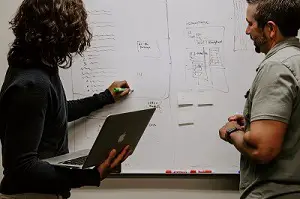If you’re looking for a polite but effective way to ask someone to speed up a process, careful choice of language is key.

Consider opening with a phrase such as, “I understand the importance of being thorough, however, I would really appreciate it if…” followed by an explanation of why the process needs to move along faster. Make sure your request for expedience is reasonable and courteous.
Suggest a timeline for completion that is achievable but not too much of an inconvenience, such as, “Would it be possible to have this completed by X date?”
If necessary, ensure that you’ve provided all the relevant information or materials needed in order to make it easy for the other person(s) involved to fulfill this timeline. Let’s look at some more scenarios where asking someone to speed up a process in a formal way may be necessary.
Why Would Someone Desire to Speed Up a Process?
In the fast-paced world of today, many people desire to speed up processes in their lives. Efficiency is key and shaving off even a few seconds here and there can add up over the course of a day or week.
Not only does this give them more time to attend to other tasks, but it can also provide a sense of accomplishment and satisfaction.
For example, speeding up project completion at work allows someone to finish faster, giving them more time for themselves afterward. Their productivity also increases which can make them look better in the eyes of their colleagues or supervisors.
Additionally, individuals may want to make sure that they’re constantly staying on top of new developments within an industry so speeding up processes becomes crucial for success in that regard.
As such, it is clear why people may strive to make adjustments to speed up processes throughout their lives – it’s all about time management and getting the most out of each day!
But using a direct method to ask someone to speed up their work may be perceived as pushy and could potentially harm the good impression you have with them, especially if the due date is far off or they feel pressured to speed things up too much.
How Can I Speed Up a Procedure Without Asking?
One of the best ways to speed up a procedure is by preparing ahead of time. Before beginning the process, make sure that you understand all of the steps and have any necessary materials easily accessible.
Are you talking to the right person, is there a specific deadline, does the person know about all the necessary details to expedite things? It’s a big difference if you need results in the next few minutes or the next two weeks.
Ahead of starting, create a goal for yourself and think about how to break down the task into smaller chunks that are easier to address. Once ready to start, concentrate on only one step at a time and focus specifically on completing each action.
Additionally, remove distractions like music or television as much as possible in order to maximize efficiency. With careful preparation and mindful progress, many procedures can be expedited without requiring outside help.
When Should You Gently Request a Procedure Be Sped Up?
It is important to know the best times to speak up and request a procedure be sped up. In general, if work seems to be delayed, it is not inappropriate for you to check in respectfully about the timeline of the process.
You can start by asking politely when you can expect progress and if anything else is needed in order to keep the process going.
For instance, you may say something such as:
“Do you have an idea of when this might be complete? Can I help with anything?”
Additionally, try to offer words of appreciation; thanking your contact for their patience or hard work can go a long way.
Offering solutions as needed can also show that you’re taking initiative and working together as partners towards a successful project outcome.
How Can I Properly Request a Faster Process Without Seeming Demanding or Impatient?
One way to politely request a faster process is to start by expressing understanding for any delays.
For example, you might say:
“I understand that you have other important matters to take care of and I don’t mean to be pushy, but could you help speed up the process as much as possible?”
Including an extra few details in your request can also help, such as deadlines or upcoming events.
A good phrase to use at the end of your request may be:
“It would really mean a lot to me if you could help me out here”
This conveys a sense of sincerity and appreciation without being too demanding.
Most importantly, it is essential to remain humble, respectful, and reasonable throughout this conversation; following these guidelines during the request should ensure that inquiring about a faster process does not come off as impatient or rude.
What Are the Advantages of Speeding Up a Procedure Without Asking Vs. Asking Politely?
When it comes to speeding up procedures, the advantage of taking action without asking is that you can get results quickly. However, it is always better to ask politely in order to ensure a good outcome for everyone involved.
Instead of simply demanding that someone does something for you, use phrases more likely to yield positive responses, such as:
“Could you please help me with this?”
“Would you mind lending a hand with this project?”
When asking nicely, use an engaging and considerate tone to communicate clearly and effectively–that way the conversation feels closer and more respectful from the start.
Asking in a friendly manner not only sets the tone for an effective dialogue but also opens doors for collaboration. Taking the time to be courteous may seem unnecessary in the short term, but it can result in improved relationships and long-term gains.
Conclusion
Careful wording is essential if you want to ask someone to speed up a procedure in a way that is both courteous and successful.
To get the ball rolling on getting things done quickly, you may say something like:
“I realize the necessity of being thorough, however, I would really appreciate it if…”
Remember to be reasonable and polite when asking for something to be done quickly.
Provide a reasonable deadline for completion, such as:
“Would it be possible to have this completed by X date?”
Make sure you’ve given the other party everything they need to complete their part of the project on schedule, including any essential documentation.

Katie Holmes is a senior author at everyday-courtesy.com with over 15 years of experience in marketing and psychology. As a freelance consultant, she also supports companies and executives in overcoming communication challenges. Katie is a passionate digital nomad working on her first book on the art of communication.

